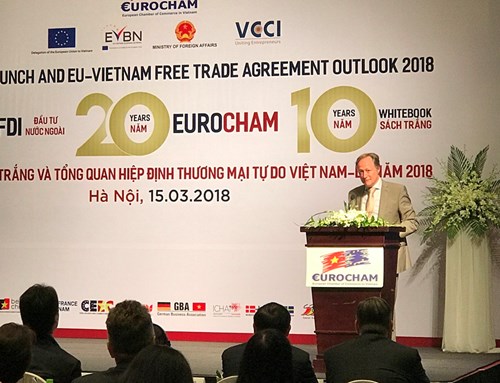The Whitebook is a collective expression of the views of EuroCham’s members on specific aspects of the business environment in Vietnam. The information and views put forward in the Whitebook are solely intended to promote a constructive dialogue and offer recommendations to the Vietnamese government for the improvement of European – Vietnamese business relations.
    |
 |
|
At the launching ceremony of the 10th edition of Whitebook |
Speaking at the launching ceremony, EuroCham President Gellert Horvath said the new edition of the Whitebook was released on the occasion of the 20th founding anniversary of EuroCham.
He added that 2018 is a special year for EU-Vietnam relations as the two sides are preparing for the enforcement of the EU-Vietnam Free Trade Agreement (EVFTA), which is expected to take effect this year.
The Whitebook includes a chapter on the EVFTA highlighting its significance to businesses and governments, he revealed.
Ambassador Bruno Angelet, Head of the EU Delegation to Vietnam, said the EU is a big investor in Vietnam, while Vietnam is a strategic partner of EU.
Vietnam remains an attractive market to the EU and a big exporter to the union with high-quality products, he said, adding that the Southeast Asian country has grown to become a middle-income nation.
This year will open up a new cooperation framework for the EU and Vietnam, Angelet said, noting that the EU could help Vietnam to achieve sustainable economic growth.
The diplomat expressed his confidence that the EVFTA will help promote the bilateral relations in the foreseeable future.
The recommendations in the Whitebook 2018 will create favourbale business environment for the two sides and ensure the effective implementation of the EVFTA, he added.
Meanwhile, Vietnamese Deputy Prime Minister Vuong Dinh Hue showed his delight at the growth of EuroCham from 60 members in 1998 to nearly 1,000 members at present, saying that the figure demonstrated that Vietnam is an open market with numerous investment opportunities.
The Vietnamese government has gained a lot of benefits from the development of EuroCham, he said, adding that the government has always acknowledged the recommendations from EuroCham members over the past 10 years and is willing to take measures in the short, medium and long terms to meet their proposals, including the EVFTA.
He noted that with the support of businesses, the two sides concluded negotiations on the EVFTA in December 2015, then finalised legal revision procedures.
There are some technical issues that need to exchange more, however, with the will and determination of both sides, such matters will be addressed soon so that the agreement could be officially signed and approved this year, he said.
With two-way trade increasing to over 50 billion USD in 2017 from just 4 billion USD in 2000 and thousands of EU investment projects in Vietnam, the Deputy PM believed that the new, high-quality and comprehensive trade agreement will help optimise potential and bring the bilateral relations to a new height.
The signing and ratification of the EVFTA will deliver an important message to the world about the two sides’ determination to create and maintain an open environment for trade and investment, he added.
The two sides had done all possible things to build a comprehensive and high-quality agreement, meeting expectations of their businesses, Hue said.
He voiced his hope that EuroCham will actively push on the ratification of the EVFTA in EU nations to bring it into force as soon as possible.
The Vietnamese government will accelerate technical and necessary procedures according to the country’s regulations to speed up the signing, ratification and implementation of the EVFTA, he affirmed.
The pact is an important part in Vietnam’s international economic integration strategy, the Deputy PM stressed.
Along with the Comprehensive and Progressive Agreement for Trans-Pacific Partnership (CPTPP) signed by Vietnam and 10 other countries on March 8, 2018, the EVFTA demonstrates Vietnam’s determination to maintain a transparent, open, and friendly environment to foreign investors and obeying fundamental principles of the multilateral trade system, he noted.
Source: VNA